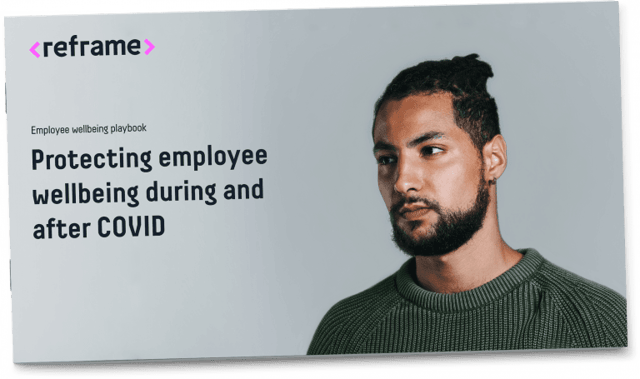As we near the end of lockdown 3.0, the nations’ health and wellbeing remains at the forefront of the public agenda. The world of work has dramatically shifted, and many believe the impact of the pandemic will be long-lasting — 82% of businesses consider remote working to be a permanent solution.
Employees’ needs and expectations have evolved due to health and job uncertainty. As restrictions begin to ease, businesses need to continually review and evolve their approach to communications, workplace policies and employee benefits if they are to thrive in the short, medium and long term. Organisations that protect the health, safety and welfare of their workforce will reap the benefits — a reduction in sickness absence, fewer incidences of employee burnout and sustained motivation, which will ultimately increase productivity and boost the bottom line.
Top tips for improving employee wellbeing
Establish effective communication and employee support networks
As remote working becomes the norm, line managers must continue to encourage regular team and one-to-one meetings to provide a forum for communication. This is especially important the longer people are forced to work from home in isolation. Do your best to ensure the channel and frequency of communication suits your employees as well as the business. For example, a quick WhatsApp message might be more manageable for a working parent than a lengthy Zoom conference.
With the extension of the government’s furlough scheme until September, rising levels of unemployment and ongoing economic uncertainty, many workers are feeling concerned about their jobs as well as their health. Keeping your people up-to-date with the latest information on government guidelines, company policies and plans for the future will help them to feel valued, boost employee morale and alleviate stress — all of which will help them to focus on their work and remain productive.
Effective communication ensures employees feel listened to and informed about the direction of the company, as well as plans for overcoming challenging situations. Communication should be two-way — while you keep an open line of communication with employees and encourage them to give feedback, it is just as important for you to demonstrate that you’ve listened and have taken action.
Provide a multi-dimensional employee wellbeing programme
COVID-19 has accelerated the need for employers to modernise their wellbeing strategies. In light of employees’ evolving needs and expectations, traditional benefits and wellbeing programmes are falling short of the kind of flexible, holistic and hyperpersonal support that employees need.
According to Mercer’s 2020 Health on Demands Report, only 51% of employees think the benefits offered to them are highly relevant. To remain of value to employees, businesses must rethink the range of benefits they offer and the way in which they are delivered. The solution should not be about investing in or redesigning one wellbeing initiative after another, but carefully tailoring your approach to the needs of your workforce. Can you redesign or re-communicate your benefits, so they remain relevant to employees accessing them remotely?
Businesses can achieve a 45% improvement in engagement and wellbeing by providing effective support for their employees’ physical and mental health in response to COVID-19.
Adopt a flexible and empathetic leadership style
We are in a constant state of flux with transmission levels and government regulations changing by the day. Accommodating your employees evolving needs will future-proof your business against unexpected health and economic upheavals.
Be flexible and understanding where possible and ensure your policies are suited to new ways of working. Trust your people to manage their workload and complete their tasks as they see fit. Of course, deadlines and targets must be met, but employers should review their priorities to take account of the extraordinary circumstances we find ourselves in. Some people may need time off for medical appointments, longer breaks or the freedom to make personal calls during work hours — if they have a family member who is unwell or shielding, for example.
If an employee has had to take a leave of absence, due to their own illness or that of a family member, plan a phased return to work. This might include offering temporary part-time hours or adapting their job role and performance targets to ensure that expectations are realistic and not adding undue stress.
While many employees have adjusted well to remote working since the first lockdown, there may be some who do not have the perfect home set-up, for example, sharing a small space with a partner or having a child or pet interrupting their calls.
Establish a peer support system
Set up a buddy system and allow time for people to talk with their assigned partner. This doesn’t need to be a formal system, an opportunity for a coffee or a FaceTime can provide a much-needed boost to mental health and wellbeing. Partnering more experienced employees with newer recruits will also facilitate the sharing of practical skills and knowledge that could alleviate stress and anxiety.
A peer support system is an effective way to monitor stress and spot the signs of someone who is struggling early on. It is important to allow people time to talk to their buddy during work hours and to send a clear message that this is encouraged.
Promote a positive work-life balance
Pre-COVID, many people could only dream of ditching the commute and working in their pyjamas. The government continues to encourage people to work from home where possible. It’s often easier to work longer hours and skip breaks when working from home — especially for those who are new to remote working. This imbalance can have a negative impact on employee wellbeing and mental health. Encourage team members to take frequent breaks if they work remotely or to work around their home commitments if possible — creating a happier and healthier workforce.
Employers can act as role models for a healthy work-life balance. Take the time to understand the current pressures on your employees and adapt your ways of working to avoid adding more — if you send emails or schedule meetings out of hours, your staff may feel obliged to do so.
Create a supportive environment for your staff by maintaining a sense of community — albeit virtually. Continue to share company milestones and celebrate big birthdays with social events — a virtual bake-off, bingo or fancy dress, for example. Having a screen break, getting outdoors and being active are essential requirements for employee wellbeing.
Businesses are likely to have a growing number of employees who need healthcare support in the winter months — the NHS waiting list reached over 4.4 million by the end of last year as a result of the pandemic. While our top tips focus on employees, we mustn’t forget the management team within organisations, who may be handling more questions or supporting front line staff, such as line managers, team leaders and even HR teams who will also be feeling additional pressures themselves.
We continually strive to align our offer with the changing healthcare needs of the modern workplace. We have developed our COVID-19 Support Programme specifically to support individuals, families and employers during the pandemic. Our unique and cost-effective programme helps people to feel informed, reassured and confident to move forward with work and navigate life during this uncertain time.
Download our playbook on protecting employee wellbeing during and after COVID.
See how we could help your organisation by booking a consultation.
